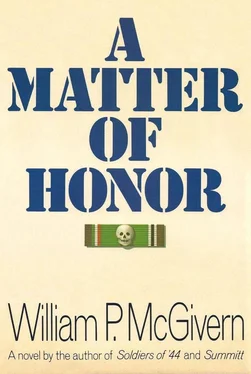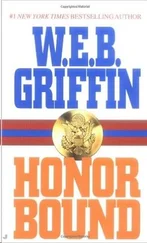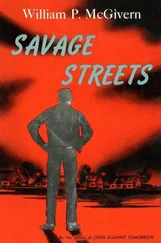When the items were lined up between them, the captain pushed each one across the desk toward Weir with a well-manicured finger. Besides the key to the Mercedes there was a leather case with NATO markings for the general’s identity cards and a packet of documents with appropriate seals and stamps, defining the temporary assignment for General Tarbert Weir, U.S. Army, retired, now serving as an accredited observer at the NATO field maneuvers in the proscribed areas outside Ludensdorf.
“I would advise you to wear these at all times in the field,” the captain said, pointing to a pair of stretch armbands, each marked: OFFICIAL OBSERVER. “Another one of the improvements since your time,” he added. “These have reflecting threads, and can be seen in the dark.”
He picked up a waterproof pouch, untied the binders and pulled out a small-scale grid map. A long gray ash from his cigarette fell on the map and he blew the residue away with impatience, sending a dust of ash onto the sleeve of Tarbert Weir’s uniform. For a moment the two men’s eyes met and it was Tranchet-LeRoi who turned away first. “My apologies, general,” he said coolly. He made a cross with a pencil on the map. “I have checked rosters and here is where your man should be at 2:00 a.m.”
“And you want this, of course,” he said, dropping a pair of keys on a metal ring to the desktop. “The key to — what was the quaint phrase my mother said you used?”
“ ‘Maison Gris’ is what your group calls them, I believe,” Weir said. “The United Kingdom uses ‘Bluebirds’ and the Germans say ‘Falltur’ or ‘Trapdoor’. The American code word has always been ‘Case Ace’.”
“My mother tells me you were one of the bright military minds who helped organize this ‘safe house’ system, for top political personnel and high Army brass, an emergency escape route.”
“Marta’s wrong there,” Scotty Weir said. “Those escape houses, old ski chalets, country schoolhouses, isolated farms — that route was selected, laid out and supplied in the late 1940s, the time of the first Berlin airlift, in preparation for a ‘worst possible scenario,’ an invasion of the continent by the Russians. It was a concern even then, captain.
“I didn’t organize or pick these hideaways originally, but I did assist in reorganizing and relocating the system in the middle sixties.”
Weir picked up the key ring and examined the small metal tag with the numeral two imprinted on it.
“There are three Case Aces within a fifty mile radius of these maneuvers,” Weir said. “I requested number two because it’s up the mountain, secluded, and the closest to Ludensdorf.”
General Weir gathered the identification documents into the leather folder and put it, with the map pouch and armbands, into his inner tunic pocket. Then he hooked the keys to the Mercedes and the key to Case Ace, number two, onto his personal key ring.
The silence in the office stretched out. The general knew their business was not finished but he was determined the captain would speak first.
Tranchet-LeRoi lit a fifth cigarette with fingers that trembled in anger. “Goddamn your Yankee stubbornness,” he said at last. “You’re not going to ask about the gun, are you?”
“I figured you’d bring it up.”
“All right. A gun is something else, Weir. So far the car, the observer’s credentials, those things are harmless, almost official. But I can’t issue a permit for a regulation service revolver unless you tell me exactly what your plans are.”
“I can’t do that, Alain,” he said.
“Then I have only one option,” the captain said and opened the top desk drawer. “I offer you something personal, something of a family heirloom on my father’s side.” He put a self-loading pistol, the barrel etched with silver inlay, and a small box of ammunition on the desk. “It is in perfect firing condition. I have checked it out myself.” He paused. “It could do the trick for you.”
Weir looked at the gun without touching it. “And it could also get me arrested for carrying an unofficial firearm, couldn’t it? You could pick up that phone before I got out the front gate.”
There were touches of color in the captain’s cheeks and he ground out his cigarette in the ashtray with a savage twist. With the other hand he swept the pistol and ammunition back into the top drawer.
“Just one more question before you leave, my friend,” he said. “ Where do you get your guts? Why in hell did you expect me to put my ass on the line for you?”
The insolence, the hatred in the question forced Weir to pause, to try to read the Belgian’s face, to put order into his own thoughts. Then he spoke firmly, but with restraint.
“Something happened a long time ago, captain. I thought you knew that. For that action I was awarded the Medal of Honor by my own government. And I was awarded two decorations by your government. One gives me the freedom and courtesy of that city through the Order of Brussels, the other extends the gratitude of His Belgian Majesty, King Leopold, to Tarbert Weir in perpetuity. And I figured if your king was willing to lay his gratitude on the line, you — as an individual Belgian — also owed me something. It’s an American concept, Alain. In Las Vegas it’s what’s called ‘an open I.O.U.’ I’m calling in my markers.”
The two men stared at one another for a long moment, then Captain Tranchet-LeRoi nodded abruptly. “So be it. And since I’ve paid my debt, may I ask a special favor of you, general?”
Tarbert Weir nodded.
“Make this the last time you see any of the Tranchet-LeRois,” he said. “My father was not out of town on business yesterday. He was in a pub in the village, waiting to see your car drive out of town. I may not speak for my mother, but I am certain I speak for my father and myself. We have had enough. Can you imagine what it has been like to compete for a lifetime against the great and glorious Scotty Weir? What more do you want of us? A war that’s been over for more than three decades and whose fire still blows through our lives, how long must we be grateful?”
His voice was shrill with emotion, and he stood abruptly, placing his hands flat on the desk, the knuckles pressed white with tension.
“We are Belgique and proud of it. We want now only to be ourselves. Is that not something you could force yourself to understand? Have you any concept, General Weir, how tired we are of Americans, how tired we are of heroes?”
Weir stood and walked toward the office door. His own anger was so sudden, that he put his hand on the doorknob to steady himself. He wanted to turn back and tip the desk onto the floor, spilling papers and files, and flinging the desk drawer with the antique pistol out over the carpet. He wanted to take the young officer by his tunic and shake him until there was no longer any look of judgment or rebuke in his pale eyes. He wanted to kill this smug, vengeful European who knew neither the young man Scotty Weir had once been, nor the young Mark Weir who was dead while this Belgique still lived.
Instead he forced himself to speak almost kindly. “Think sometime, captain, where you Belgiques would be, where all of Europe would be if it weren’t for Americans and heroes.
“Most mortals, soldier and civilian, go through life on secret orders till a moment of crisis, when something bigger than human measure is asked of them. It’s then they open those orders. That’s how heroes find out who they are.”
General Weir put on his garrison cap and opened the door. “ ‘A hero is a man who endures for one moment longer...’ I’m not the first man who said that, Alain, but I’m obviously the first one who said it to you.”
Читать дальше












